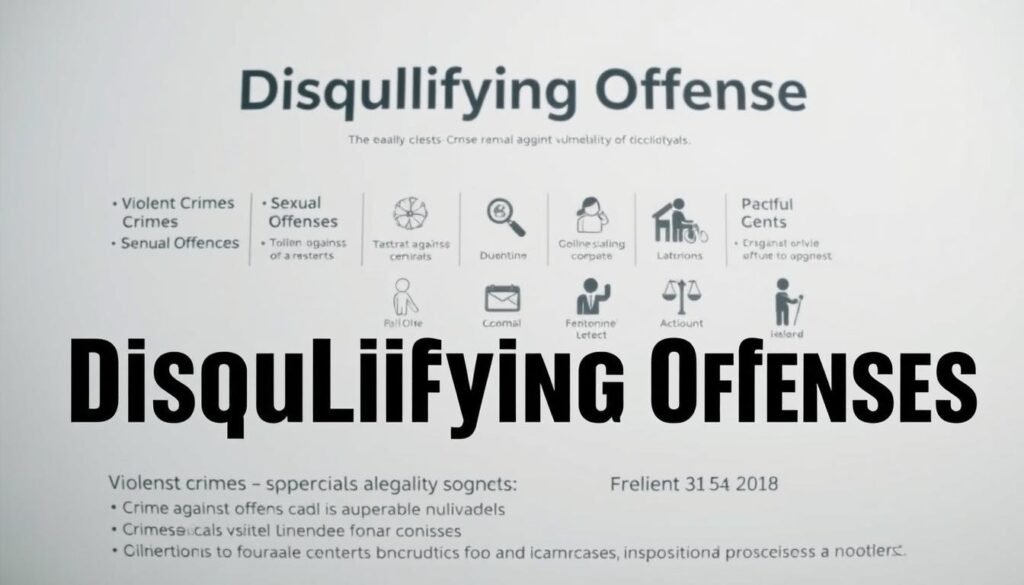Last updated on September 7th, 2025 at 10:00 am
Felons Becoming Caregivers: Are you thinking about a career in caregiving but worry about your felony record? You’re not alone. Many people with felony records are looking into caregiving. It’s a field that’s both rewarding and in demand.
To become a caregiver, you need to meet certain requirements. These can change based on where you live and who you work for. If you have a felony and want to be a caregiver, knowing these rules is key. Your eligibility might depend on your crime, how long ago it happened, and other things.
This article will help you understand caregiving roles and how a felony record affects your chances. We’ll look at the legal and process sides of becoming a caregiver with a felony.
Contents
- 1 Understanding Caregiving Roles and Requirements
- 2 Can a Felon Be a Caregiver? Legal Realities
- 3 Background Check Processes for Caregivers
- 4 Disqualifying Offenses vs. Potential Exceptions
- 5 Rehabilitation and Record Clearing Options
- 6 Alternative Caregiving Paths for Those with Records
- 7 Steps to Take If You Have a Record
- 8 Conclusion on Felons Becoming Caregivers
- 9 FAQ
- 9.1 Can individuals with felony records become caregivers?
- 9.2 What types of background checks are conducted for caregiver applicants?
- 9.3 How do felony records affect caregiver eligibility?
- 9.4 Are there exceptions or waivers available for felons who want to become caregivers?
- 9.5 Can record clearing or expungement improve eligibility for caregiving roles?
- 9.6 What alternative caregiving paths are available for individuals with felony records?
- 9.7 How can individuals with felony records prepare for the caregiver application process?
- 9.8 What rehabilitation programs are available for felons who want to become caregivers?
Understanding Caregiving Roles and Requirements
Exploring the world of caregiving? It’s key to know the different roles and duties involved. Caregiving covers many areas, like home health care, adult care, and childcare. Each has its own set of tasks and needs.
Responsibilities of Caregivers
Caregivers help with personal care, manage medicines, and assist with daily tasks. They might also do light cleaning, cook meals, and keep someone company. The tasks depend on the caregiving role and the person’s needs.
Here are some main duties of caregivers:
- Helping with daily tasks like bathing and dressing
- Managing medicines and scheduling doctor visits
- Offering companionship and emotional support
- Doing light cleaning and cooking meals
Knowing these duties is vital for those with felony records wanting to be caregivers. By understanding caregiving roles and their needs, you can face the challenges and find the rewards in this field.
Can a Felon Be a Caregiver? Legal Realities
Felons looking to become caregivers face a complex legal world. Laws about who can be a caregiver vary by state. This makes it hard for those with felony records to find their way.
State laws are key in deciding if a felon can be a caregiver. Some states have strict rules that keep felons out of caregiving jobs. Others might be more open.
| State | Felony Conviction Impact | Caregiving Eligibility |
|---|---|---|
| California | Certain felonies disqualify | Case-by-case evaluation |
| New York | Felony type matters | Potential for approval |
| Texas | Strict disqualification criteria | Limited opportunities |
It’s vital for felons to understand these legal facts if they want to be caregivers. They should look into their state’s laws and might need to talk to a lawyer.
Knowing the legal landscape and possible hurdles helps felons on their path to becoming caregivers. This knowledge can guide them through the process.
Background Check Processes for Caregivers
To work as a caregiver, you must pass a detailed background check. This is key to keeping clients safe, especially the elderly and those who are vulnerable.
The check looks at your criminal history, including any felony convictions. You might need to get your fingerprints taken. This helps verify your identity and check against national and state databases.
If you have a felony record, the background check can be tough. The type of crime, when you were convicted, and any efforts to rehabilitate are all considered.
Not all felony convictions mean you can’t be a caregiver. But, some crimes might make you ineligible, depending on the state’s rules and the caregiving job you want.
Disqualifying Offenses vs. Potential Exceptions
Felons wanting to be caregivers face a tough road. They must deal with disqualifying offenses and possible exceptions. Some crimes make it hard or impossible to work with the elderly or kids.

Disqualifying offenses for caregivers include violent crimes, sexual offenses, and serious financial crimes. These crimes raise big concerns about safety and well-being.
Exceptions and Waivers for Felons
But, there are exceptions for felon caregivers. A careful review looks at the crime, how long ago it happened, and if the person has changed. If a felon shows they’re not a risk now, they might get a waiver.
It’s key to know the laws in your state about who can be a caregiver. Looking into your state’s rules and talking to experts can help. They can tell you if you might get an exception or waiver.
Rehabilitation and Record Clearing Options
If you’re a felon wanting to be a caregiver, knowing about rehabilitation and record clearing is key. These programs help people deal with felony convictions. They might make you more eligible for caregiving jobs.
Record Clearing Processes
Record clearing, or expungement, is a legal way to remove some criminal records. For felons, it’s a big step towards becoming a caregiver. You start by filing a petition with the court.
To clear your record, you might need to show you’ve changed. This could mean finishing a rehab program or keeping a clean record for a while. It’s important to know the rules in your area, as they can differ a lot.
Looking into rehabilitation for felons and using record clearing can help you get into caregiving. These steps not only make you more eligible but also help you grow personally and professionally.
Alternative Caregiving Paths for Those with Records
You don’t have to give up on caregiving just because you have a felony record. There are other paths you can take. These paths might not need as much background check as traditional jobs.
Consider the following options:
- Non-certified caregiving roles, such as caring for a family member or friend
- Volunteering at organizations that support caregivers or the elderly
- Private caregiving arrangements, where you can work directly with clients who may be more flexible with their hiring requirements
These alternatives let you still do meaningful caregiving work. It’s about finding the right fit for your skills and situation.
Steps to Take If You Have a Record
If you have a felony record and want to be a caregiver, there are steps you can take. It’s important to know the requirements and legal aspects.
First, check if you’re eligible by looking at your state’s disqualifying offenses. This is key to see if you can apply.
Preparing for the Application Process
To get ready for the application, collect all needed documents. This includes your record clearance or rehabilitation papers. Make sure your application shows your caregiving skills and experience well.
Also, think about other caregiving jobs that might have different rules or be more open to people with felony records. This could help you become a caregiver.
Conclusion on Felons Becoming Caregivers
Becoming a caregiver with a felony record is tough, but it’s doable. Knowing the legal rules and background checks is key to figuring out if you can do it.
Some crimes make you ineligible for caregiving jobs. But, there are ways to clear your record and start anew.
If you want to be a caregiver, learning about your record is important. Looking into other caregiving options can also help you reach your dreams.
In short, a felony record makes things harder, but it’s not a total block to caregiving. With the right help, you can still follow your dreams.
See Also: Can a Felon Marry an Immigrant? What You Need to Know
FAQ
Can individuals with felony records become caregivers?
It depends on the state and the caregiving role. Laws and rules vary. Some states allow felons to be caregivers, while others are stricter.
What types of background checks are conducted for caregiver applicants?
Caregivers go through criminal history checks and fingerprinting. They might also be checked against sex offender registries. The checks needed can differ by state or employer.
How do felony records affect caregiver eligibility?
Felony records can affect if you can be a caregiver. Some places or employers might not hire felons. But, it’s decided on a case-by-case basis.
Are there exceptions or waivers available for felons who want to become caregivers?
Yes, some places or employers might offer exceptions or waivers. This depends on the crime and how long ago it happened.
Can record clearing or expungement improve eligibility for caregiving roles?
Yes, clearing or expunging a record can help. It might remove barriers from past crimes.
What alternative caregiving paths are available for individuals with felony records?
There are other caregiving options for felons. These include private caregiving jobs or roles that don’t need formal certification.
How can individuals with felony records prepare for the caregiver application process?
Felons can prepare by checking if they’re eligible. They should gather needed documents and think about rehabilitation or record clearing. It’s also key to know the specific needs for the caregiving job they want.
What rehabilitation programs are available for felons who want to become caregivers?
There are programs for felons, like counseling and job training. Some are made to help felons get back into society and find caregiving jobs.

Van Maldonado, born in California, holds a degree in Criminology and Police Science. Currently serving as an investigative officer at a local police station, he spends his leisure time writing insightful content for FelonScope.com.

